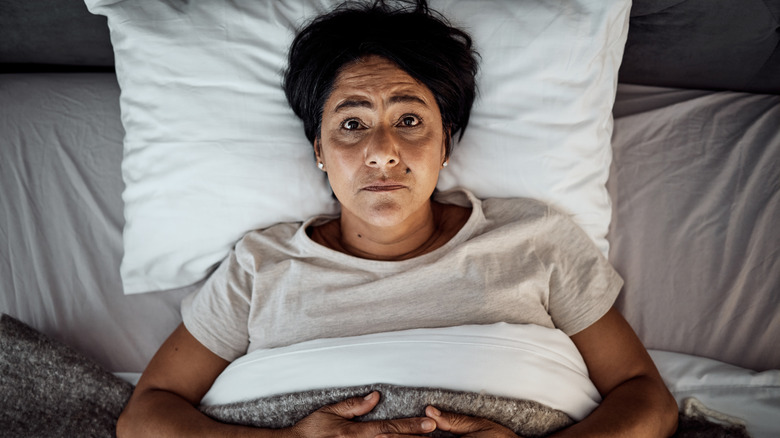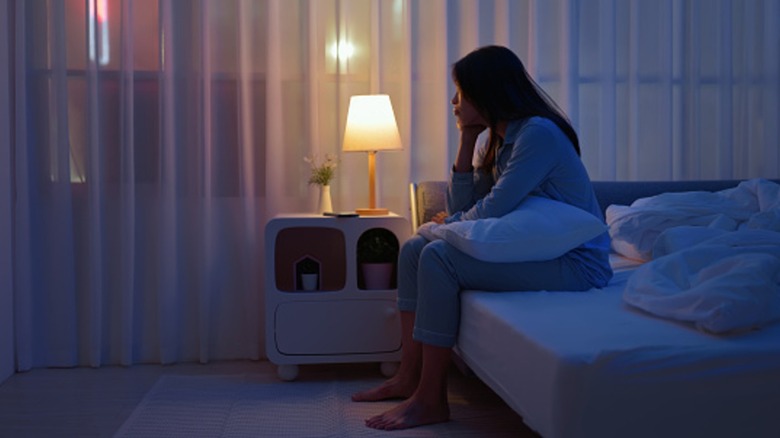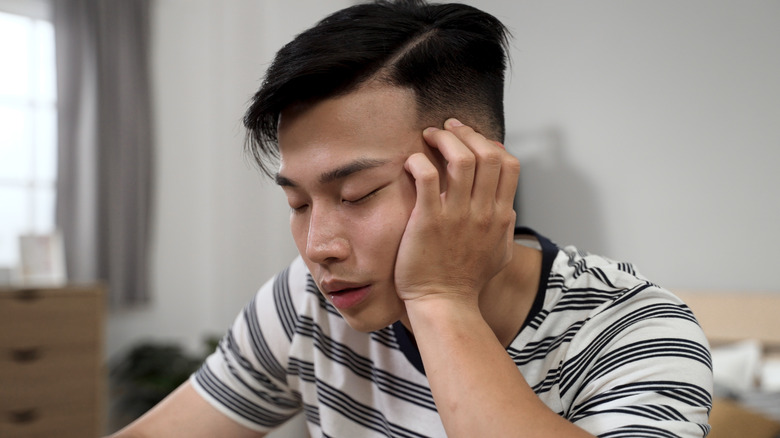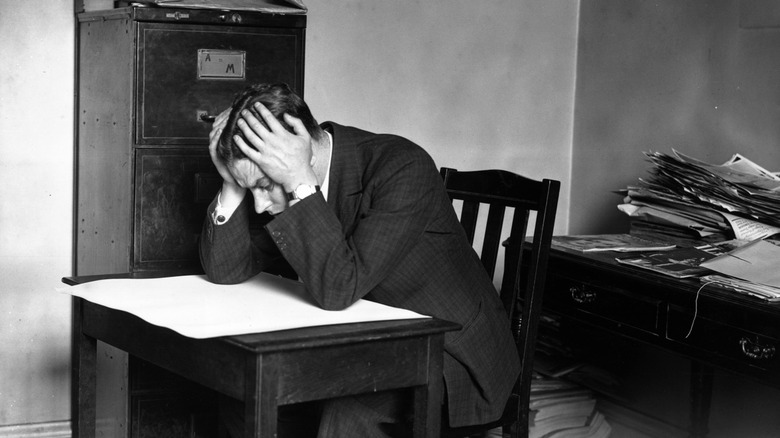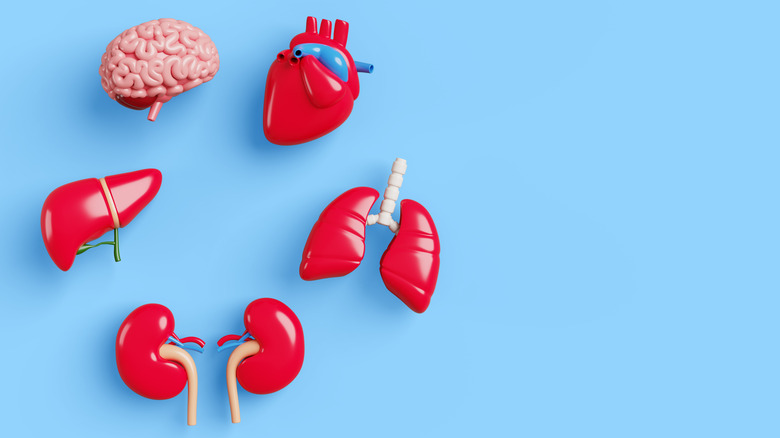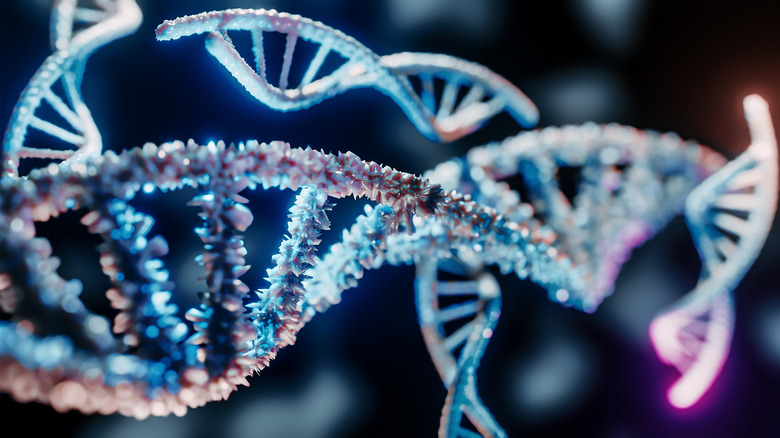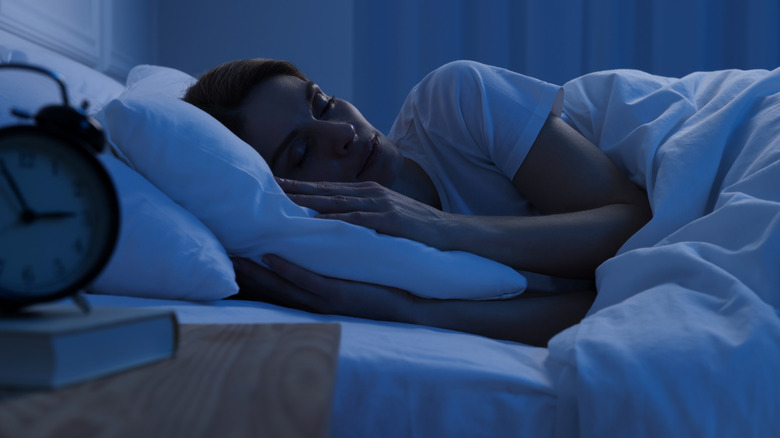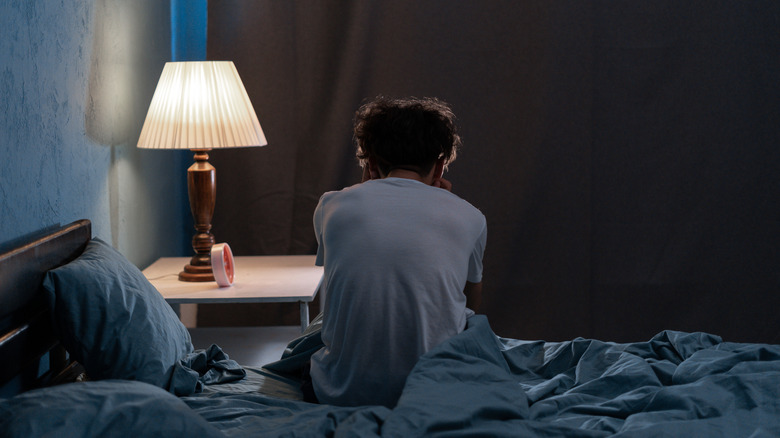What Happens To Your Body If You Don't Sleep?
As all too many of us know, not sleeping can feel pretty awful. Just one night without it can leave you a muggy, disorganized mess, more apt to sit around on the couch and feel gross than get anything done. While sleep deprivation of this duration isn't great — you probably shouldn't drive if you can help it, as many experts claim a missing night of sleep can produce impairment on the level of drunk driving — it is unlikely to seriously harm you, so long as you get back on the sleep train the next night.
But what if you don't? In short, sleep deprivation is rough on your body — real rough. Sure, starvation may take you faster than skipping sleep will, but long-term sleep deprivation is still pretty bad news for practically all your major systems. If you manage to stay awake for another night, your body is going to start feeling the effects in the form of exhaustion, increased blood pressure, and hallucinations (that could soon tip into psychosis). Stay awake for yet another stretch — and another, and another — and things are really going to start going haywire. Here are the nitty-gritty details of just what happens to your body when sleep is out of reach for too long.
Sleep deprivation moves through stages that start off pretty dire
Many calculate sleep deprivation in five stages, broken down by just how long someone has been awake. The first stage, in which someone would have been awake for a full 24 hours without sleep, may not sound apocalyptically bad, but it's hardly an ideal state. If you've ever pulled an all-nighter or have had to stay up with a fussy newborn, then you know the miserable nature of just a single missed night of sleep. Besides being exhausted and on edge, you may all too easily make extra mistakes throughout your day, as your attention span and general cognition are seriously impacted by those missing eight hours or so of slumber.
While you're attempting to get through the day, don't try to get behind the wheel if you can help it. That's because your impaired cognition and delayed reaction times are not that far off from someone who's had a more lively night out. The Centers for Disease Control estimates that 24 hours without sleep produces a cognitive impairment that's equivalent to a 0.10% blood alcohol concentration. For comparison, the standard legal benchmark for intoxication is 0.08%. And remember, this is all only in the very first stages of sleep deprivation. Go further, and things can quickly get even more intense.
After 24 hours, hallucinations may begin ... and can get much worse
Hallucinations can begin as early as 24 hours without sleep. These may take the form of relatively mild changes in perception, but as time progresses without any sleep, they can transform into more vivid visions that could become outright psychosis.
A systematic review published in Frontiers in Psychology found that nearly all subjects — who experienced sleep deprivation lasting from 24 hours to an eye-watering 11 days — experienced some form of visual distortion or hallucination. Those disordered patterns often progressed into psychosis after 72 hours without sleep. A 1959 attempt by radio DJ Peter Tripp, which lasted 8 days, reportedly included dramatic paranoid hallucinations. Hallucinations are also a feature of fatal familial insomnia, the rare genetic disorder in which affected patients are eventually unable to sleep at all.
What causes this? Many studies suggest dopamine is at play. This neurotransmitter regulates many functions in your body, including memory, mood, and motivation. When it comes to sleep, dopamine appears to be involved in the rapid eye movement (REM) stage, where you are most likely to dream and process information learned during the day. Staying up for too long may knock dopamine levels out of whack; scientists have found that too much dopamine in parts of the brain is connected to apparent auditory hallucinations in animal studies (via Science). Curiously, Tripp's hallucinations seemed to play out in cycles that mimicked REM sleep stages (his post-attempt sleep included exceedingly long REM sleep stages, too).
Your body will try to force you to sleep
Willpower can do a lot for you, but when it comes to warding off sleep, your body is working hard to gain the upper hand and finally get some shut-eye. People who have stayed awake long-term, whether they choose to do so or not, must fight a battery of attempts by their own body to make them sleep. Generally speaking, about 36 hours in, you will feel an intense urge to snooze as the body's sleep pressure builds. This pressure will continue increasing until many people simply fall asleep involuntarily.
But they may not strictly know that they've fallen asleep. In some situations, people may experience extremely short episodes of unconsciousness known as microsleeps. These last only seconds at a time and, to an observer, it may not look like someone's nodded off at all. But their brain has effectively shut off for that very brief period, kind of fulfilling the notion of sleeping with one eye open (hey, why not both?). This means no new information is getting through and, metaphorically and sometimes literally, no one's at the wheel. That's bad enough if you're sitting on a couch at home, but for people working long shifts as nurses, soldiers, truck drivers, or other key positions, this could prove disastrous. Military studies have found that fragmented episodes of sleep, presumably including microsleeps, have led to dangerous friendly fire incidents. Moreover, microsleeps do next to nothing to restore waning cognition or energy.
Cognition becomes seriously impaired the more sleep deprivation continues
If you've missed a slumber session entirely, then you already know that thinking afterward can feel agonizingly slow. But extended sleep deprivation can lead to more than having to re-read instructions or taking a wrong turn. A 2003 study published in Sleep tracked 48 adults, split into three groups with sleep restricted to eight, six, or four hours per night over 14 days. While we're here, it's worth noting that fully restricting someone's sleep over even a few days is ethically fraught; even the Guinness Book of World Records has stopped tracking such attempts due to the possible dangers involved. And the aforementioned study demonstrates just why, as participants in the four-hour group experienced significant lapses in alertness, working memory, and overall cognition. Researchers found that subjects who had six or fewer hours of sleep began experiencing the sort of cognitive problems seen in people who stayed totally awake for up to two nights.
Just what cognitive issues are we discussing? A 2025 review published in Military Medicine found that most of the studies considered tested subjects on their reaction times and the accuracy of their responses, with some focusing on short-term working memory. Other factors included the ability to switch between tasks efficiently, motivation, and emotional state. All were affected to some degree, though some factors (like attention and reaction time) were helped if subjects had gotten extended sleep beforehand — though only for the short term.
Social-emotional judgment and risk-taking become jumbled
Sleep deprivation also appears to hit the parts of your brain that make social evaluations and manage risk. Take a 2021 study published in Sleep, in which a group of 34 participants were confronted with non-participants acting angry or scared. Those who were fully rested avoided both groups. Meanwhile, the sleep-deprived participants (they were kept awake for 27 hours) avoided the angry people, but neither approached nor avoided the scared ones. The study's authors suggested that sleep-deprived people might not always avoid ambiguously weird (and potentially dangerous) situations like a scared stranger.
Multiple other studies have found that sleep deprivation is more likely to increase risky behavior. That's especially worrisome for parents of already risk-prone teenagers, who are also — perhaps not coincidentally — regularly sleep deprived. Maybe that's not such a concern for casino owners thinking about grown patrons, as a 2011 study published in the Journal of Neuroscience demonstrated that sleep-deprived subjects were more likely to make risky bets in hypothetical gambling situations.
However, it's important not to get too overzealous when it comes to estimating the long-term effects of sleep deprivation on someone's personality. Less-cautious accounts of radio DJ Peter Tripp's eight-day stint awake will tell you that he experienced serious personal and professional upset in the aftermath. However, Tripp may have just been going through some common woes; plenty of people get divorced and fired while maintaining good sleep practices, after all.
Your organs are not going to be happy with you
Your body needs you to sleep — yes, your whole body. Research has consistently shown that even short-term or less-intense sleep deprivation is linked to all manner of problems that go beyond the brain, with the cardiovascular, immune, and nervous systems all taking potentially major hits. What's more, sleep deprivation can wreak havoc on your metabolism, and has been linked to increased risk of obesity and type 2 diabetes. And if you have experienced even short-term sleep deprivation and its effect on your mood, then it comes as no surprise that mental health can be seriously impacted by a lack of good sleep.
In short, pretty much all of your organs can be harmed by serious and extended sleep deprivation. A study published in JAMA Internal Medicine linked it to coronary heart disease in female subjects, while another paper in Cureus more broadly linked sleep deprivation and heart disease in a study involving more than 28 million participants. Another study in Diabetes, Metabolic Syndrome and Obesity found a link between poor sleep and metabolic syndrome, which can include problems such as elevated blood sugar and high blood pressure. It's also been associated with kidney disease, according to Kidney International.
Medical records of nine Guantanamo Bay detainees, who were subject to sleep deprivation as part of a suite of "enhanced interrogation techniques," also suggest that they experienced serious physical aftereffects as a result of this torture (via PLOS Medicine).
Sleep deprivation is linked to mood disorders
A lack of sleep can certainly dampen your mood, but extended sleep deprivation also has a worrisome link to mood disorders like anxiety and depression. In some cases, it's hard to tease out which came first, as mood disorders can also cause sleeplessness, but the connection is demonstrably there. And it's one that has been demonstrated time after time, with clear links between longstanding insomnia and mood disorders.
Besides a variety of anxiety disorders and depression, sleep-deprived people are also more likely to experience anger, according to a review published in Cureus. Anecdotally, people who have attempted records for staying up have certainly reported increased episodes of irritability or even rage as their sleep deprivation stacked up. Randy Gardner, whose 1959 attempt stretched to over 264 hours, told NPR that "The longer I stayed awake, the more irritable I got." He particularly recalled getting snippy with reporters. "I was a brat," Gardner concluded.
At the Guantanamo Bay Detention Center, among other chilling details about the place, detainees reported experiencing significant mood upsets in the wake of sleep deprivation, employed as an "enhanced interrogation technique" by U.S. service members working there. These included the hallmarks of anxiety, depression, hallucination, and dissociation. In one study involving nine detainees, four experienced thoughts of self-harm, while two attempted to actually follow through on those thoughts. Some researchers have since argued that numerous detainees would qualify for a diagnosis of post-traumatic stress disorder, even after their release from Guantanamo (via PLOS Medicine).
Digestion can go haywire
While practically all parts of your body are going to feel the effects of sleep deprivation, the digestive system can produce some of the more attention-grabbing symptoms, especially as a lack of sleep begins to compound. Studies indicate that chronic sleep deprivation can suppress brain regions that regulate appetite, while also boosting the activity of your amygdala, the region of the brain that's often involved with managing emotions and linking those up to your memory and learning processes. For many, this combines to boost appetite and decrease willpower, even when you've already eaten.
Yet that's not the whole picture, as some more intense episodes of sleep deprivation may actually suppress appetite. Fatal familial insomnia, the genetic disorder in which rogue prion proteins wreak havoc in the brain, can leave late-stage patients totally unable to sleep and wracked by dementia. These patients have also been observed experiencing decreased appetite and marked weight loss through the relentless course of the disease.
Even when someone isn't facing deadly brain proteins, they have reported a milder lack of appetite. Randy Gardner recalled that his 1959 attempt left him feeling sick to his stomach, telling NPR that "I was really nauseous. And this went on for just about the entire rest of the experiment." Rob McDonald, who went over 18 days without sleep in 1986, told reporters near the end of his attempt that "I'm ready to collapse because I have had a hard time keeping any food down" (via UPI).
A genetic disorder can lead to dementia and sleep deprivation
Fatal familial insomnia (FFI) is a very rare genetic disorder that offers little reprieve during its forced march into dementia and, ultimately, death. FFI is a prion disease, meaning it is caused by a protein in the brain that incites other proteins to misfold and clump together, leading to serious damage and landing it amongst some of the most painful ways to die in history. A case study published in Internal Medicine, in which a patient was affected by movement problems, dementia, and hallucination, found similarities between brain scans of those with FFI and patients affected by Lewy body dementia.
Though it is rare, FFI is an autosomal dominant disease, meaning that anyone who inherits the faulty gene will eventually experience its symptoms. Its hallmark is progressively dire insomnia, accompanied by multitudinous problems that include high blood pressure, cognitive problems (like memory lapses), issues with coordination, mood disorders, and endocrine disruption (leading to weakness and weight loss). Some patients have been observed carrying out everyday actions while in the midst of their increasingly fragmented sleep cycle, including dressing themselves or interfering with medical equipment.
FFI patients experience a progressive loss of neurons, eventually leading to a near-complete cessation of sleep, an inability to move or speak voluntarily, coma, and death. Multiple scientists are developing treatments that alleviate the progression and are working on a longer-term cure. Currently, however, FFI patients affected by the unfolding network of prions in their brains are only treated symptomatically.
Recovering from extended sleep deprivation will take a long time
You might think that sleep deprivation can be addressed just by getting a good night's sleep, but the knock-on effects of going without slumber for a long time aren't so easily fixed. Addressing a sleep deficit isn't a simple one-to-one equation, where one hour of sleep lost is made up for by an extra one snoozing. A 2021 PLOS One study found that 13 healthy participants in their 20s, all of whom experienced 30% sleep deprivation over 10 nights, needed over a week of unrestricted sleep to recover (in fact, they hadn't really recovered by the time the study was over).
Admittedly, 13 people is a pretty small sample size, but it shores up an emerging body of research that indicates even seemingly minor sleep deprivation can have serious and lingering effects. An earlier study published in Scientific Reports noted that just one night of complete sleep deprivation seriously knocked out the memories of 39 participants and had a noticeable impact on activity in their hippocampus (the part of your brain in charge of memory and learning). Two nights of recovery sleep helped, but subjects still noticeably lagged on memory recall tasks.
Presumably, those dealing with even longer-term sleep deprivation have a serious amount of catch-up to do. The best bet of all, according to sleep scientists, is to practice good sleep hygiene and get good rest in the first place.
Intense sleep deprivation can be deadly
Could losing out on enough sleep kill you? Apart from those with fatal familial insomnia — their lack of sleep is a symptom of brain damage caused by prions — it's possible. Though research is still emerging, none of what's been published looks good for one's life expectancy.
Sleep deprivation has been linked to serious auto accidents and workplace injuries, especially when overnight or shift work messes with someone's sleep cycle. Chronic sleep deprivation is also linked to a grim lineup of life-ending problems, including high blood pressure, diabetes, stroke, and even increased cancer risks, among others. Quality of sleep was also important, as a 2025 study in Scientific Reports — involving more than 9,600 people over 15 years — demonstrated.
Animal-based research has also indicated that long-term deprivation really can be deadly. Research published in a 2020 issue of Cell found that fruit flies and mice subjected to long-term sleep deprivation had elevated levels of reactive oxygen species (ROS) in their bodies, especially in the digestive system. At high levels, ROS can oxidize and therefore damage important components of cells, including DNA, and enough ROS and oxidation can kill a cell. When researchers attempted to clear ROS from the guts of fruit flies, they appeared to live out their full life span even without any sleep. Of course, humans are not fruit flies, so don't get too excited. However, the study authors did suggest a link between sleep deprivation and diseases of the digestive system, which could contribute to someone's mortality.
